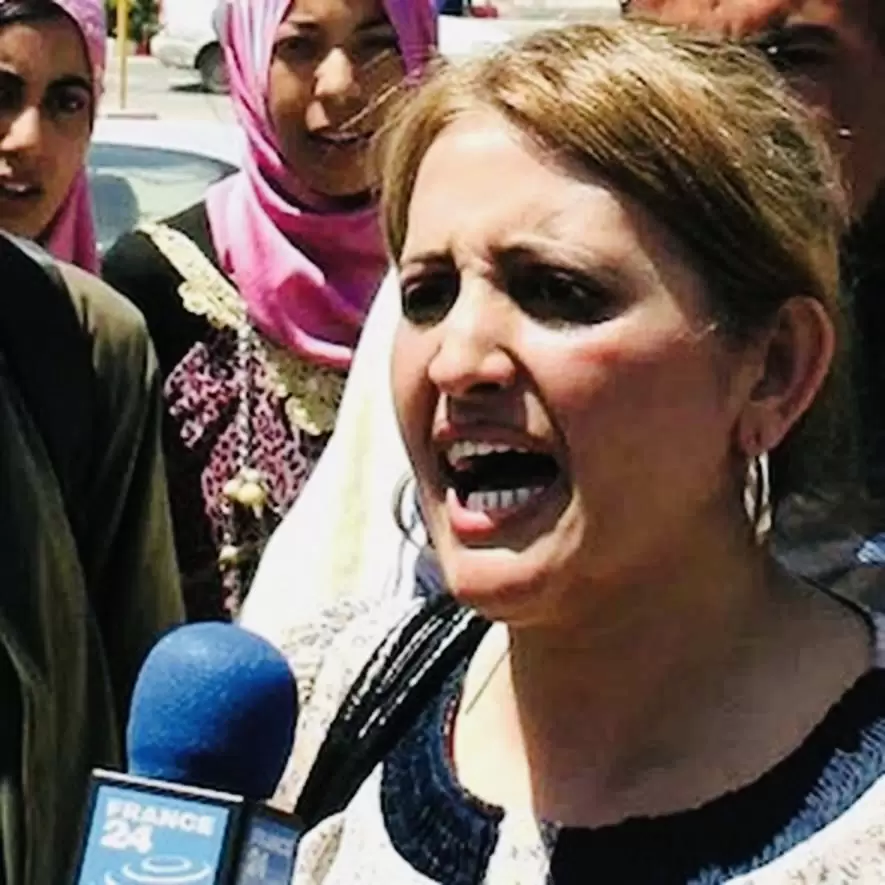Click here to read in Arabic.
Since January 28, some 40 political prisoners in Algeria have been on hunger strike, demanding release from their illegal and arbitrary detention and a halt to the increasing prosecution of democracy activists on charges of ‘terrorism’ under the new Article 87bis of the criminal code. Women, youth and members of the independent union SNAPAP, affiliated to the IUF, are among the hunger strikers incarcerated under ‘provisional detention,’ awaiting trial and sentencing. Several leaders of the IUF affiliate SNAPAP, the independent union of workers in public administration, have joined the strike in solidarity from outside.
Repression in Algeria has escalated significantly since the mass movement for democracy, the Hirak, erupted in February 2019. Covid took the Hirak off the streets in 2020, but the revival of strikes and street protests early last year led to a brutal crackdown. Following the highly mediatized release of some 40 prisoners in February 2021, the National Committee for the Release of the Detainees (CNLD) counted some 70 prisoners of conscience. Today they number 330.
And following changes to the criminal code last year, they can be prosecuted–even retroactively–for ‘terrorism’ for attempting to exercise their basic rights.
In a June 24, 2021 report, Amnesty international warned that “Since April 2021 Algeria’s authorities have increasingly resorted to the use of ‘terrorism’ or ‘conspiracy against the state’ charges to prosecute human rights defenders and Hirak activists.”
In April last year, Kaddour Chouicha, national coordinator for the education workers’ union SESS and a prominent member of the Algerian League for the Defense of Human Rights, was prosecuted along with a dozen other human rights defenders for ‘enrollment in a terrorist or subversive organization active abroad or in Algeria.’
Ramzi Darder, an auto mechanic and member of the national bureau of the National Federation of Informal Workers, affiliated to the independent confederation COSYFOP, was arrested on June 30, 2021 on charges including “terrorism,” undermining the morale of the army, and undermining national unity through his publications on social media. In August 2021, Ramzi was transferred to a prison block for death row inmates and terrorism defendants though there is still no date for his trial.
Between January 2-11, 2022, four officers of COSYFOP and the IUF affiliate SNATEG, the independent union of workers in the state energy utility SONELGAZ, were arrested and jailed, then released under ‘judicial supervision.’ They are charged under Article 87bis of the penal code with ‘organizing and recruiting a terrorist organization through social media and organizing a criminal organization harmful to national unity.’
Not all trade unionists are charged with ‘terrorism,’ but all are subjected to endless rounds of persecution at the hands of the courts and the police. Typical of this is the serial prosecution of teacher and SNAPAP militant Dalila Touat, active for many years in defending the rights of the unemployed. Dalila was arrested and jailed on January 3, 2021, charged with insulting public institutions, distributing tracts detrimental to the maintenance of public order and incitement to unlawful assembly – for urging an election boycott. Convicted and sentenced to 18 months in prison on January 19, 2021 she was provisionally released on February 19 under ‘judicial supervision’ after two hunger strikes pending her appeal. In November 2021, she was sentenced to 6 months imprisonment, again for insulting a public institution; in March, she had denounced the abusive conditions of her incarceration and sought legal remedy. On January 31, 2022, she was arrested in Mostanagem, imprisoned and charged with inciting an illegal gathering, denigrating a public body and distributing publications damaging to the national interest.
Since 2017, the supervisory bodies of the ILO have regularly confirmed violations of basic trade union rights and called on the government to guarantee the rights of unions independent of the state, so far without result.
Headquarters of independent unions have been shut and sealed by the police. Constant surveillance, serial prosecution of activists and the effective criminalization of union activity, which now includes the threat of prosecution for ‘terrorism,’ make it impossible for union members to communicate freely and to meet publicly. Union leaders and members continue to be dismissed from their jobs and blacklisted from public sector employment.
The government is preparing a harsh austerity program, laying the ground for a social explosion while it ramps up repression which denies workers all independent representation.
Immediate action is needed to secure the lives and the freedom of Algerians fighting for democracy. Now is the time for unions internationally to show active solidarity with all those imprisoned, persecuted and harassed for their democratic engagement and trade union activity as well as our sisters and brothers fighting for freedom of association and worker rights.
